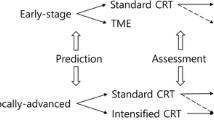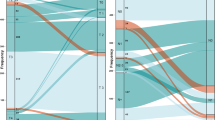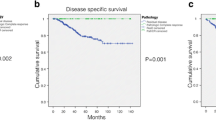Abstract
Purpose of Review
Prediction of clinical complete response is pivotal in the management of patients with rectal cancer. The ability to determine tumor response to neoadjuvant therapy in rectal cancer might guide subsequent treatment modalities. We review the current literature on predictors of complete response after neoadjuvant for rectal cancer with an emphasis of clinical complete response rather than pathological complete response.
Recent Findings
Clinical and radiological findings have been used to predict response, as well as a myriad of biomarkers. There is limited evidence validating most of these strategies. The role of imaging in defining tumor response has been assessed retrospectively. The TRIGGER trial is a randomized trial that will evaluate stratified management of rectal cancer based on their tumor regression grade.
Summary
The management of locally advanced rectal cancer is evolving. The ability to predict clinical complete response in patients that have undergone neoadjuvant chemoradiation will allow us to select potential patients that can benefit from a “watch and wait” strategy. Identifying patients that will have a complete response will result in decreased surgical overtreatment, favoring organ-sparing strategies. Treatment individualization will require further research. Emphasis should be made in validating prediction markers; these should be cost-effective and of minimally invasive retrieval. Surveillance protocols to assess for tumor regrowth are yet to be determined.
Similar content being viewed by others

Abbreviations
- cCR:
-
Clinical complete response
- pCR:
-
Pathologic clinical response
- TME:
-
Total mesorectal excision
- mrTGR:
-
Magnetic resonance tumor-grade regression
- CRT:
-
Chemoradiation
References
Papers of particular interest, published recently, have been highlighted as: • Of importance •• Of major importance
Sauer R, et al. Preoperative versus postoperative chemoradiotherapy for locally advanced rectal cancer: results of the German CAO/ARO/AIO-94 randomized phase III trial after a median follow-up of 11 years. J Clin Oncol. 2012;30(16):1926–33.
Fokas, E., et al. Tumor regression grading after preoperative chemoradiotherapy as a prognostic factor and individual-level surrogate for disease-free survival in rectal cancer. J Natl Cancer Inst 2017. 109(12).
Valentini V, et al. Ten years of preoperative chemoradiation for extraperitoneal T3 rectal cancer: acute toxicity, tumor response, and sphincter preservation in three consecutive studies. Int J Radiat Oncol Biol Phys. 2001;51(2):371–83.
Maas M, et al. Long-term outcome in patients with a pathological complete response after chemoradiation for rectal cancer: a pooled analysis of individual patient data. The Lancet Oncology. 2010;11(9):835–44.
Habr-Gama A, et al. Complete clinical response after neoadjuvant chemoradiation therapy for distal rectal cancer: characterization of clinical and endoscopic findings for standardization. Dis Colon Rectum. 2010;53(12):1692–8.
Glynne-Jones R, Hughes R. Critical appraisal of the ‘wait and see’ approach in rectal cancer for clinical complete responders after chemoradiation. Br J Surg. 2012;99(7):897–909.
Pettit C, et al. Molecular profiling of locally-advanced rectal adenocarcinoma using microRNA expression (review). Int J Oncol. 2017;51(2):393–404.
McCarthy K, et al. Pre-operative chemoradiation for non-metastatic locally advanced rectal cancer. Cochrane Database Syst Rev. 2012;12:Cd008368.
• Renehan AG, et al. Watch-and-wait approach versus surgical resection after chemoradiotherapy for patients with rectal cancer (the OnCoRe project): a propensity-score matched cohort analysis. Lancet Oncol. 2016;17(2):174–83. Large propensity-score matched cohort analysis assessing for outcomes after conservative treatment for rectal cancer. Suggests a standardized definition for clinical complete response.
Maas M, et al. Wait-and-see policy for clinical complete responders after chemoradiation for rectal cancer. J Clin Oncol. 2011;29(35):4633–40.
Habr-Gama A, et al. Nonoperative approaches to rectal cancer: a critical evaluation. Semin Radiat Oncol. 2011;21(3):234–9.
Habr-Gama A, et al. Operative versus nonoperative treatment for stage 0 distal rectal cancer following chemoradiation therapy: long-term results. Ann Surg. 2004;240(4):711–7. discussion 717-8
Lai CL, et al. Rectal cancer with complete clinical response after neoadjuvant chemoradiotherapy, surgery, or “watch and wait”. Int J Color Dis. 2016;31(2):413–9.
Appelt AL, et al. High-dose chemoradiotherapy and watchful waiting for distal rectal cancer: a prospective observational study. Lancet Oncol. 2015;16(8):919–27.
Nakagawa WT, et al. Chemoradiation instead of surgery to treat mid and low rectal tumors: is it safe? Ann Surg Oncol. 2002;9(6):568–73.
Habr-Gama A, et al. Local recurrence after complete clinical response and watch and wait in rectal cancer after neoadjuvant chemoradiation: impact of salvage therapy on local disease control. Int J Radiat Oncol Biol Phys. 2014;88(4):822–8.
Smith JD, et al. Nonoperative management of rectal cancer with complete clinical response after neoadjuvant therapy. Ann Surg. 2012;256(6):965–72.
Dalton RS, et al. A single-centre experience of chemoradiotherapy for rectal cancer: is there potential for nonoperative management? Color Dis. 2012;14(5):567–71.
Smith RK, et al. Surveillance after neoadjuvant therapy in advanced rectal cancer with complete clinical response can have comparable outcomes to total mesorectal excision. Int J Color Dis. 2015;30(6):769–74.
Pham TT, et al. Study protocol: multi-parametric magnetic resonance imaging for therapeutic response prediction in rectal cancer. BMC Cancer. 2017;17(1):465.
Clarke TL, et al. Predicting response to neoadjuvant chemoradiotherapy in locally advanced rectal cancer with serum biomarkers. Ann R Coll Surg Engl. 2017;99(5):373–7.
Grade M, et al. The molecular basis of chemoradiosensitivity in rectal cancer: implications for personalized therapies. Langenbeck's Arch Surg. 2012;397(4):543–55.
• Tawfik B, et al. The neutrophil to albumin ratio as a predictor of pathological complete response in rectal cancer patients following neoadjuvant chemoradiation. Anti-Cancer Drugs. 2016;27(9):879–83. Survival analysis of serum biomarkers as predictors of complete response.
Habr-Gama A, et al. Low rectal cancer: impact of radiation and chemotherapy on surgical treatment. Dis Colon Rectum. 1998;41(9):1087–96.
Glynne-Jones R, et al. Complete clinical response after preoperative chemoradiation in rectal cancer: is a “wait and see” policy justified? Dis Colon Rectum. 2008;51(1):10–9. discussion 19-20
•• Kong JC, et al. Outcome and salvage surgery following “watch and wait” for rectal cancer after neoadjuvant therapy: a systematic review. Dis Colon Rectum. 2017;60(3):335–45. Systematic review evaluating use of salvage surgery for patients that underwent non-operative strategy. Analyzed 5 restrospective and 4 prospective studies. Described variability in the definition of clinical complete response among studies.
Lim SG, Kim YB, Oh SY. Clinical significance of the endoscopic finding in predicting complete tumor response to preoperative chemoradiation therapy in rectal cancer. World J Surg. 2016;40(12):3029–34.
Perez RO, et al. Role of biopsies in patients with residual rectal cancer following neoadjuvant chemoradiation after downsizing: can they rule out persisting cancer? Color Dis : Off J Assoc Coloproctol Great Britain and Ireland. 2012;14(6):714–20.
•• Habr-Gama A, São Julião GP, Perez RO. Nonoperative management of rectal cancer: identifying the ideal patients. Hematol Oncol Clin North Am. 2015;29(1):135–51. Report on complete response assessment, clinical significance and management using a 'Watch and wait' protocol.
Bhoday J, et al. Magnetic resonance tumor regression grade and residual mucosal abnormality as predictors for pathological complete response in rectal cancer postneoadjuvant chemoradiotherapy. Dis Colon Rectum. 2016;59(10):925–33.
van der Paardt MP, et al. Patients who undergo preoperative chemoradiotherapy for locally advanced rectal cancer restaged by using diagnostic MR imaging: a systematic review and meta-analysis. Radiology. 2013;269(1):101–12.
Lee JH, et al. Prediction of pathologic staging with magnetic resonance imaging after preoperative chemoradiotherapy in rectal cancer: pooled analysis of KROG 10-01 and 11-02. Radiother Oncol. 2014;113(1):18–23.
Moszkowicz D, et al. Can we predict complete or major response after chemoradiotherapy for rectal cancer by noninvasive methods? Results of a prospective study on 61 patients. Am Surg. 2014;80(11):1136–45.
Yu Y, Yue J, Yu J. Value of functional magnetic resonance imaging in predicting outcomes of neoadjuvant chemoradiotherapy in rectal cancer. Zhonghua Wei Chang Wai Ke Za Zhi. 2017;20(5):491–4.
Shen, L., et al. T3 sub-classification using the EMD/mesorectum ratio predicts neoadjuvant chemoradiation outcome in T3 rectal cancer patients. Br J Radiol 2017: p. 20170617.
Krishan, S., et al. Rectal perfusion parameters normalised to tumour-free rectal wall can predict response to neoadjuvant chemoradiotherapy. Clin Radiol 2017.
Kino A, et al. Perfusion CT measurements predict tumor response in rectal carcinoma. Abdominal radiology (New York). 2017;42(4):1132–40.
Zhu HB, et al. Assessment of pathological complete response to preoperative chemoradiotherapy by means of multiple mathematical models of diffusion-weighted MRI in locally advanced rectal cancer: a prospective single-center study. J Magn Reson Imaging. 2017;46(1):175–83.
Perez RO, et al. Accuracy of positron emission tomography/computed tomography and clinical assessment in the detection of complete rectal tumor regression after neoadjuvant chemoradiation: long-term results of a prospective trial (National Clinical Trial 00254683). Cancer. 2012;118(14):3501–11.
Perez RO, et al. Predicting complete response to neoadjuvant CRT for distal rectal cancer using sequential PET/CT imaging. Techn Coloproctol. 2014;18(8):699–708.
Dos Anjos DA, et al. Semiquantitative volumetry by sequential PET/CT may improve prediction of complete response to neoadjuvant chemoradiation in patients with distal rectal cancer. Dis Colon Rectum. 2016;59(9):805–12.
Siddiqui MRS, et al. Defining response to radiotherapy in rectal cancer using magnetic resonance imaging and histopathological scales. World J Gastroenterol. 2016;22(37):8414–34.
Patel UB, et al. Magnetic resonance imaging-detected tumor response for locally advanced rectal cancer predicts survival outcomes: MERCURY experience. J Clin Oncol : Off J Am Soc Clin Oncol. 2011;29(28):3753–60.
Battersby NJ, et al. A rectal cancer feasibility study with an embedded phase III trial design assessing magnetic resonance tumour regression grade (mrTRG) as a novel biomarker to stratify management by good and poor response to chemoradiotherapy (TRIGGER): study protocol for a randomised controlled trial. Trials. 2017;18:394.
Bernhard EJ, et al. Direct evidence for the contribution of activated N-ras and K-ras oncogenes to increased intrinsic radiation resistance in human tumor cell lines. Cancer Res. 2000;60(23):6597–600.
Ghadimi BM, et al. Effectiveness of gene expression profiling for response prediction of rectal adenocarcinomas to preoperative chemoradiotherapy. J Clin Oncol : Off J Am Soc Clin Oncol. 2005;23(9):1826–38.
Huerta S, et al. Role of p53, Bax, p21, and DNA-PKcs in radiation sensitivity of HCT-116 cells and xenografts. Surgery. 2013;154(2):143–51.
Agostini M, et al. A functional biological network centered on XRCC3: a new possible marker of chemoradiotherapy resistance in rectal cancer patients. Cancer Biol Ther. 2015;16(8):1160–71.
Conde-Muino R, et al. Predictive biomarkers to chemoradiation in locally advanced rectal cancer. Biomed Res Int. 2015;2015:921435.
Senetta R, et al. YKL-40/c-Met expression in rectal cancer biopsies predicts tumor regression following neoadjuvant chemoradiotherapy: a multi-institutional study. PLoS One. 2015;10(4):e0123759.
Molinari C, et al. Gene methylation in rectal cancer: predictive marker of response to chemoradiotherapy? J Cell Physiol. 2013;228(12):2343–9.
Wang G, et al. LincRNA-p21 enhances the sensitivity of radiotherapy for human colorectal cancer by targeting the Wnt/beta-catenin signaling pathway. Oncol Rep. 2014;31(4):1839–45.
Bettegowda C, et al. Detection of circulating tumor DNA in early- and late-stage human malignancies. Sci Transl Med. 2014;6(224):224ra24.
• Carpinetti P, et al. The use of personalized biomarkers and liquid biopsies to monitor treatment response and disease recurrence in locally advanced rectal cancer after neoadjuvant chemoradiation. Oncotarget. 2015;6(35):38360–71. Evaluation of liquid biopsies to detect recurrence and monitor treatment response to neoadjuvant CRT. Proposes further avenues of research.
Kosaka N, Iguchi H, Ochiya T. Circulating microRNA in body fluid: a new potential biomarker for cancer diagnosis and prognosis. Cancer Sci. 2010;101(10):2087–92.
D'Angelo E, et al. MicroRNAs as tools and effectors for patient treatment in gastrointestinal carcinogenesis. Curr Drug Targets. 2015;16(4):383–92.
Lopes-Ramos CM, et al. Overexpression of miR-21-5p as a predictive marker for complete tumor regression to neoadjuvant chemoradiotherapy in rectal cancer patients. BMC Med Genet. 2014;7:68.
Lopes-Ramos C, et al. Comprehensive evaluation of the effectiveness of gene expression signatures to predict complete response to neoadjuvant chemoradiotherapy and guide surgical intervention in rectal cancer. Cancer Gen. 2015;208(6):319–26.
Watanabe T, et al. Prediction of sensitivity of rectal cancer cells in response to preoperative radiotherapy by DNA microarray analysis of gene expression profiles. Cancer Res. 2006;66(7):3370–4.
Kim I-J, et al. Microarray gene expression profiling for predicting complete response to preoperative chemoradiotherapy in patients with advanced rectal cancer. Dis Colon Rectum. 2007;50(9):1342–53.
Rimkus C, et al. Microarray-based prediction of tumor response to neoadjuvant radiochemotherapy of patients with locally advanced rectal cancer. Clin Gastroenterol Hepatol : Off Clin Prac J Am Gastroenterol Assoc. 2008;6(1):53–61.
Brettingham-Moore KH, et al. Pretreatment transcriptional profiling for predicting response to neoadjuvant chemoradiotherapy in rectal adenocarcinoma. Clin Cancer Res : Off J Am Assoc Cancer Res. 2011;17(9):3039–47.
Watanabe T, et al. Prediction of response to preoperative chemoradiotherapy in rectal cancer by using reverse transcriptase polymerase chain reaction analysis of four genes. Dis Colon Rectum. 2014;57(1):23–31.
Perez RO, et al. The role of carcinoembriogenic antigen in predicting response and survival to neoadjuvant chemoradiotherapy for distal rectal cancer. Dis Colon Rectum. 2009;52(6):1137–43.
Restivo A, et al. Elevated CEA levels and low distance of the tumor from the anal verge are predictors of incomplete response to chemoradiation in patients with rectal cancer. Ann Surg Oncol. 2013;20(3):864–71.
Bitterman DS, et al. Predictors of complete response and disease recurrence following chemoradiation for rectal cancer. Front Oncol. 2015;5:286.
Dayde, D., et al. Predictive and prognostic molecular biomarkers for response to neoadjuvant chemoradiation in rectal cancer. Int J Mol Sci 2017. 18(3).
Sun, Y., et al. A nomogram predicting pathological complete response to neoadjuvant chemoradiotherapy for locally advanced rectal cancer: implications for organ preservation strategies. Oncotarget 2017.
Habr-Gama A, et al. Watch and wait approach following extended neoadjuvant chemoradiation for distal rectal cancer: are we getting closer to anal cancer management? Dis Colon Rectum. 2013;56(10):1109–17.
Habr-Gama A, et al. Baseline T classification predicts early tumor regrowth after nonoperative management in distal rectal cancer after extended neoadjuvant chemoradiation and initial complete clinical response. Dis Colon Rectum. 2017;60(6):586–94.
Crowley E, et al. Liquid biopsy: monitoring cancer-genetics in the blood. Nat Rev Clin Oncol. 2013;10(8):472–84.
Domany E. Using high-throughput transcriptomic data for prognosis: a critical overview and perspectives. Cancer Res. 2014;74(17):4612–21.
Author information
Authors and Affiliations
Corresponding author
Ethics declarations
Conflict of Interest
The authors declare that they have no conflict of interest.
Human and Animal Rights and Informed Consent
This article does not contain any studies with human or animal subjects performed by any of the authors.
Additional information
This article is part of the Topical Collection on Surgery and Surgical Innovations in Colorectal Cancer
Rights and permissions
About this article
Cite this article
Taveras, L.R., Cunningham, H.B. & Imran, J.B. Can We Reliably Predict a Clinical Complete Response in Rectal Cancer? Current Trends and Future Strategies. Curr Colorectal Cancer Rep 14, 56–63 (2018). https://doi.org/10.1007/s11888-018-0401-1
Published:
Issue Date:
DOI: https://doi.org/10.1007/s11888-018-0401-1



